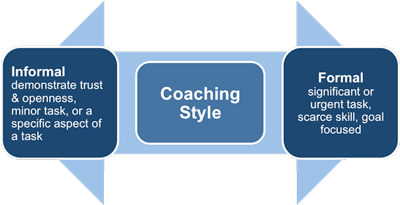Formal and Informal Coaching
Once you have decided on whether your coaching will be internal or external you then need to define how it will be delivered. This means deciding whether or not the coaching will be formal or informal. This decision will be largely based on the importance and urgency of the task an individual requires coaching for.
Where formal coaching is being used, both the manager and the team member will be clear that they are engaged in 'coaching' and will be explicitly committed to the process. Each coaching session will be timetabled and both parties will spend their time in coaching mode - that is, with the manager engaged in active listening, asking questions, and giving feedback while the coachee does most of the talking.
 |
Formal coaching sends a powerful signal to individual team members that their development and success is important, and that the manager is there to provide support. In addition, because both parties are focusing their efforts on the process it tends to work well.
The task in question is usually a significant one and there is an urgent need for the team, division, or organization to have additional people capable of performing this task or in possession of a scare skill. This style of coaching is usually focused on goal-orientated tasks rather than everyday ones.
Informal coaching can happen as part of the everyday conversation between the manager and a team member if the manager is using a collaborative leadership style. In this case, neither party would describe the process as 'coaching' even though that is actually what is happening.
This style of coaching is often used to develop a particular aspect of a task. Managers also use more informal coaching to help demonstrate that they want to promote a team atmosphere of trust, collaboration, and willingness to discuss and promote new ideas.
This Coaching Session Template will help you to maintain the focus of each coaching session and provides a record of progress made and actions committed to. This Coaching Session Checklist is designed to help the coach to develop their coaching techniques by keeping a record of the coaching session.
Many managers use both formal and informal styles depending on their own preference, the coachee's preference, the organizational culture, and the goals of the team at that point in time.
You may also be interested in:
Coaching Management Style | Management Coaching Skills | Differences Between Coaching and Training | Differences Between Coaching and Mentoring | Internal and External Coaches - Advantages and Disadvantages | Coaching Skills for Managers | Successful Coaching Skills.



